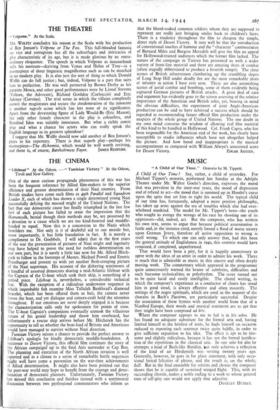" A Child of Our Time." Oratorio by M. Tippett.
MUSIC
A Child of Our Time ? Say, rather, a child of yesterday. For Michael Tippett's oratorio, performed last Sunday at the AdelPhi
Theatre under Mr. Walter Goehr's direction, expresses the mood that was prevalent in the inter-war years, the mood of depression and of refusal to act—the mood that is summed up in Hamlet's curse upon the spite that set him to right his world. The typical child of our time has, fortunately, adopted a more positive philosophy, has taken up arms against the sea of troubles which else had over- whelmed mankind. The model for Mr. Tippett's hero—the youth who sought to avenge the wrongs of his race by shooting one of its oppressors—did, indeed, act. But the composer, who has written his own text, seems to argue that because political assassination is futile and, in the instance cited, merely loosed a flood of worse misery upon German Jewry, therefore all active opposition to wrong is itself wrong. To which one can only answer that, had this been the general attitude of Englishmen in 1940, this oratorio would have remained, if completed, unperformed.
That would have been a pity, for it is happily unnecessary to agree with the ideas of an artist in order to admire his work. There is much that is admirable as music in this sincere and often deeply moving work. The commentary which appeared in the programme quite unnecessarily warned the hearer of subtleties, difficulties and such fearsome technicalities as polyrhythm. The score turned out to be quite lucid and easily intelligible. The choral writing, in which the composer's experience as a conductor of choirs has stood him in good stead, is always effective and often masterly. The settings of the negro spirituals, which are used in the manner of the chorales in Bach's Passions, are particularly successful. Despite the association of these hymns with another world from that of a Nazified Europe, their words and musical sentiment are so ipt that they might have been composed ad hoc.
Where the composer appears to me to fail is in his solos. He has found no adequate substitute for the formal aria and, having limited himself to the briefest of texts, he finds himself on occasion reduced to repeating each sentence twice quite baldly, in order to give sufficient expansion to his idea. The effect is apt to be tire- some and slightly ridiculous, because it has not the formal justifica- tion of the repetitions in the classical aria. In one solo for alto he attempts a kind of Bach-like floridity, but only achieves a reflection of the kind of air Hindemith was writing twenty years ago. Generally, however, he goes in for plain statement, with only occa- sional lyrical felicities of phrase, and the result is, on the whole, dull. But in the final ensemble for soloists and chorus tht composer shows that he is capable of sustained winged flight. This, with its succeeding chorale, makes a noble ending to a work to whose general tone of self-pity one would not apply that adjective.
DYNELEY HUSSEY.


























 Previous page
Previous page